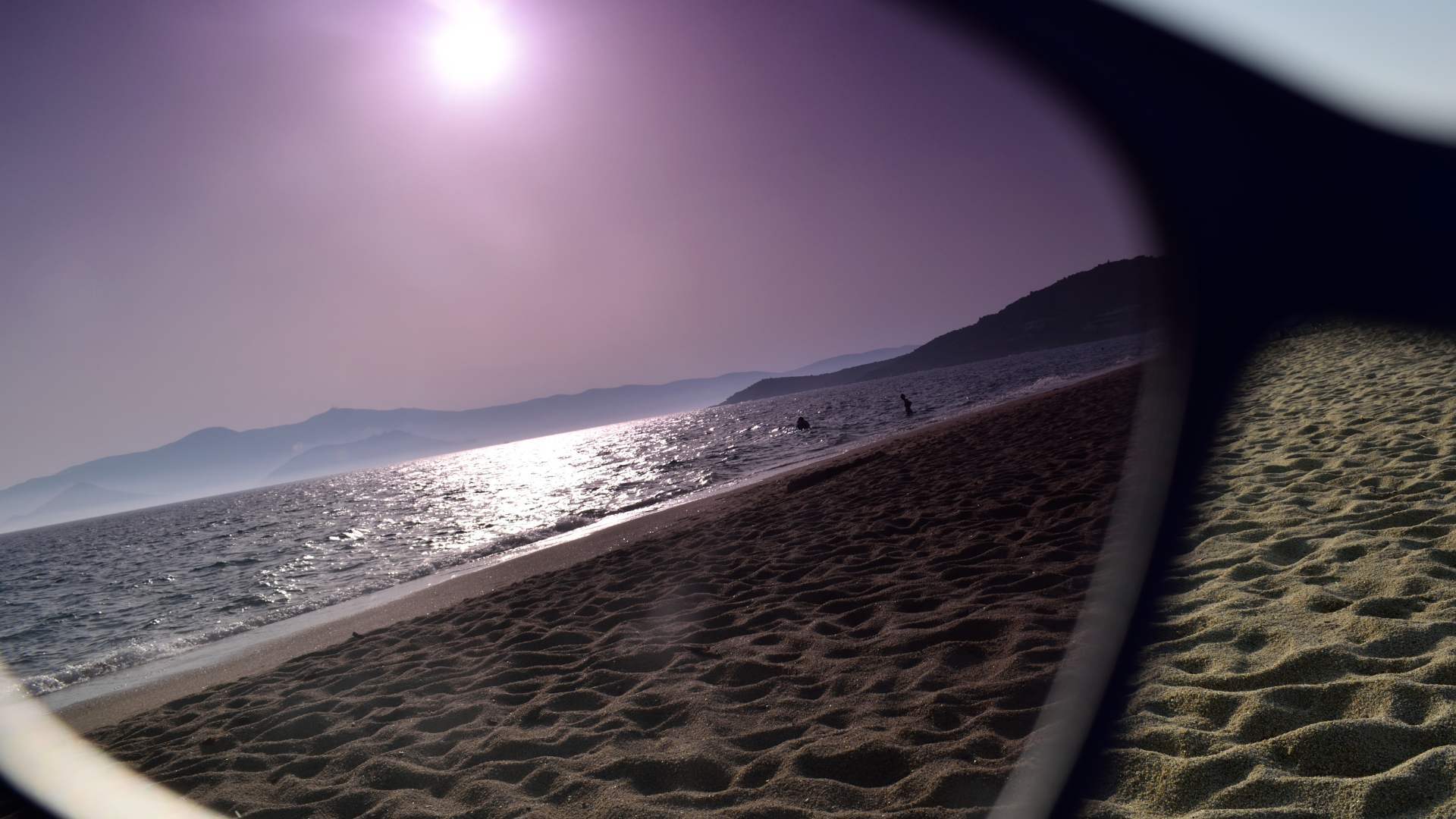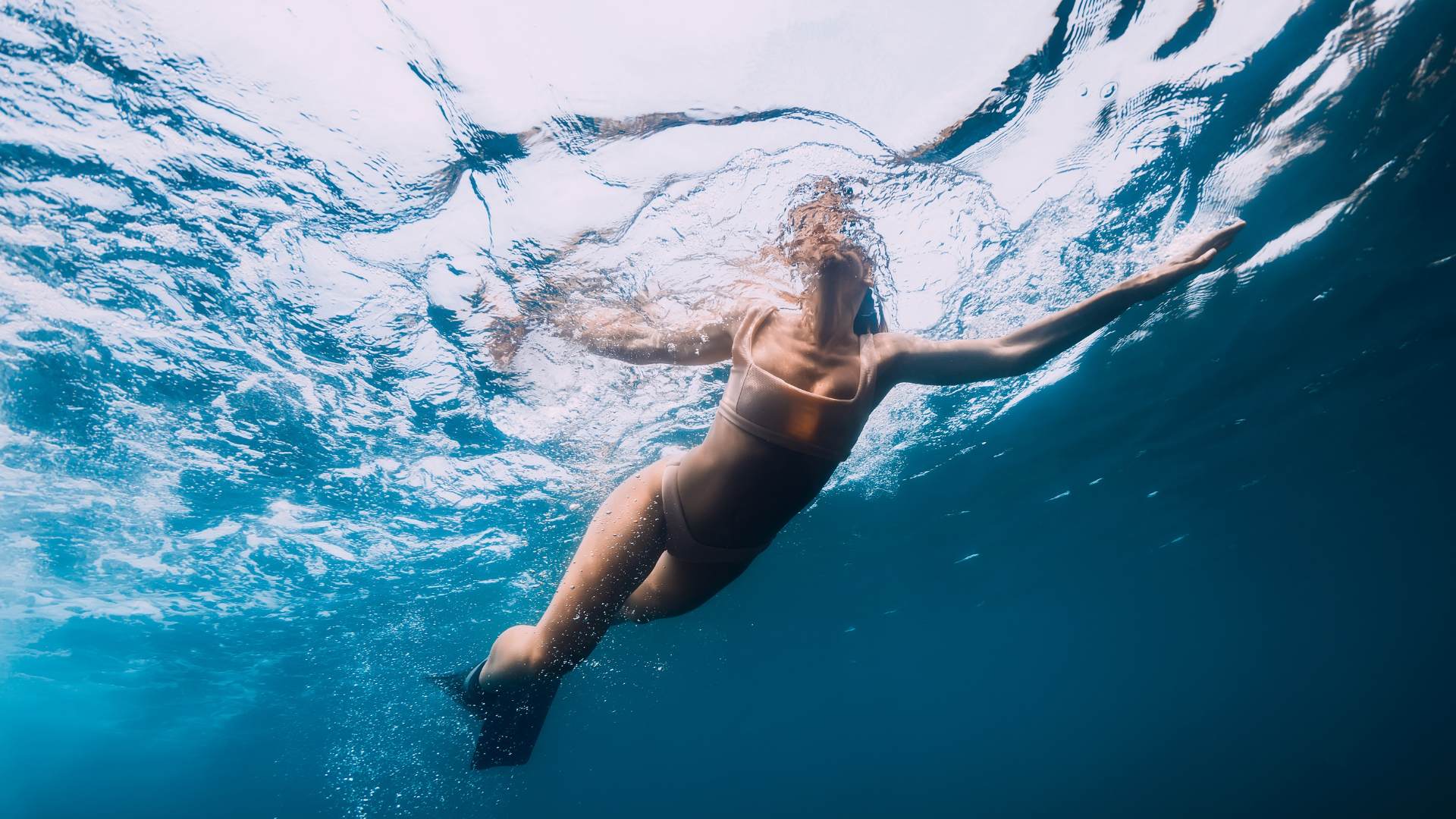
What are polarized sunglasses?
Polarized sunglasses are your eyes' best friend during sunny beach days and water activities. Unlike regular sunglasses that just darken your view, polarized lenses contain special filters that block dangerous glare from water, snow, and sand.
Quick links:
When should I use polarized sunglasses?
Benefits of polarized sunglasses
Drawbacks of polarized sunglasses
UV or polarized: what to choose?
Let's learn how polarized sunglasses work and why they offer superior eye protection during your favorite water activities.
What is polarization in sunglasses?
Polarized sunglasses contain a chemical film between the lens layers that filters light waves. This technology blocks intense glare that bounces off horizontal surfaces such as water, snow, or sand. Regular sunglasses darken your view, but polarized lenses specifically target and eliminate reflected light that causes eye strain and poor visibility.
Light waves travel in all directions from the sun. When these waves hit flat surfaces, they reflect horizontally in a concentrated beam straight toward your eyes. This concentrated reflection creates glare, which causes squinting, headaches, and impaired vision.
Polarized lenses use a microscopic filter pattern that blocks these horizontal light waves. The filter acts similar to window blinds, letting in vertical light waves for clear vision. With horizontal glare blocked, your eyes see colors more vividly and objects with better contrast.
For water activities, polarized sunglasses give you better visibility above and beneath the water's surface. Swimmers, boaters, and beachgoers notice sharper details and reduced eye strain. This improved vision adds safety and comfort to your beach day.
When to use polarized sunglasses
Polarized sunglasses protect your eyes in situations where bright sunlight creates intense reflective glare. The specialized coating blocks reflections that standard non-polarized glasses cannot filter out.
Here are some situations where you should wear polarized sunglasses:
-
Water sports: Athletes need clear vision in the water, and polarized lenses eliminate surface reflections to reveal potential hazards beneath the surface.
-
Sight fishing: Anglers see fish and underwater structures clearly because polarized lenses remove the water's reflective barrier.
-
Driving: Sun glare bounces off other vehicles and road surfaces (especially wet roads), but polarized lenses block these dangerous reflections for safer navigation.
-
Snow sports: Athletes face intense reflection from snow and ice, but polarized lenses create comfortable visibility in bright winter conditions.
-
Beach activities: The sun reflects strongly off sand and water, but polarized lenses turn this blinding glare into clear, comfortable vision.
What are the benefits of polarized sunglasses?
Polarized lenses offer many benefits:
-
Reduce glare from reflective surfaces such as water, snow, and pavement.
-
Improve visual clarity and contrast and make colors appear more vivid.
-
Reduce eye fatigue and strain, especially during outdoor activities.
-
Provide better depth perception and detail recognition.
-
Prevent squinting, which can lead to headaches.
-
Useful for water activities since they cut through surface glare, letting you see into the water better.
What are the disadvantages of polarized sunglasses?
Polarized sunglasses are purpose-built, so they are unnecessary and distracting in some situations.
-
They can make it difficult to view LCD displays, including phones, car displays, and ATM screens.
-
They can cause visual distortions in some situations, particularly when looking through car windows (because of the stress patterns in tempered glass).
-
They can make it harder for pilots to read certain cockpit instruments and see ice glare on windshields.
-
They can make it harder to spot icy patches, which appear as dark spots.
-
Some people experience disorientation or dizziness while wearing them, especially when first adjusting to them.
-
The polarized coating can be more delicate than regular sunglass coatings and may wear off over time.
Which is better: UV or polarized sunglasses?
UV protection and polarization serve different purposes. UV protection blocks harmful rays that can damage your eyes, while polarization reduces glare. For complete eye safety, good sunglasses should include both features.
Non-polarized lenses with UV protection stop harmful radiation but won't reduce glare from reflective surfaces. Polarized lenses without UV protection won't shield your eyes from sun damage, even though they cut glare and improve visibility.
Research from Harvard Health shows that combining polarization and UV protection gives your eyes the most complete defense against sun damage.
The best polarized sunglasses
The best polarized sunglasses offer quality UV protection and durability. Ray-Ban Aviators feature classic metal frames with green or gray polarized lenses that reduce glare effectively. Maui Jim sunglasses stand out for their lightweight frames and exceptional lens clarity.
Costa Del Mar Fantail sunglasses are known for their durable nylon frames. Oakley Holbrook gives athletes reliable performance with their Prizm lens technology. Smith ChromaPop rounds out the top options with impact-resistant lenses and versatile style.
Look for maximum UV protection, sturdy frames, and lens clarity when choosing polarized sunglasses. Since you’re already here, take a look at our polarized sunglasses collection.
SwimZip’s sunglass collection
SwimZip offers two types of sun-protective sunglasses:
-
Viper Style UV400 sunglasses come in striking color combinations. Each pair includes bendable side arms for a custom fit and delivers 100% UVA and UVB protection. Every purchase includes a hard zipper case with a transport clip, a protective pouch, and a cleaning cloth.
-
Wayfarer kids’ sunglasses protect young eyes with 100% UVA and UVB protective lenses. The smooth, bendable frames improve durability and comfort for active children.
Polarized sunglasses FAQ
Who should not wear polarized sunglasses?
Pilots shouldn't wear polarized sunglasses because they can interfere with viewing critical cockpit instruments and LCDs. They're also problematic for people who need to read a lot of digital screens, as polarization can make displays appear dark or distorted in certain angles.
Should you drive with polarized sunglasses?
Polarized sunglasses are good for driving as they reduce light glare from roads, other vehicles, and reflective surfaces in bright light. While some car displays might appear slightly darker, the benefits of reduced glare and improved visibility make them safe and beneficial for driving.
How to tell if glasses are polarized?
Look at an LCD screen (your phone or calculator) through the lenses while slowly rotating the glasses 90 degrees. If they're polarized, the screen will appear to darken significantly or turn black at certain angles. This happens because polarized lenses block light waves coming from specific directions.
Is it okay to wear polarized glasses all the time?
While safe for most everyday activities in sunny conditions, polarized sunglasses shouldn't be worn in low-lighting conditions or at night because they significantly reduce light transmission. They're most effective when there's bright sunlight and glare from reflective surfaces such as water, snow, or roads.
Are polarized glasses better for the eyes?
Polarized glasses are an excellent choice for reducing glare and improving visual comfort, but they don't automatically block harmful rays. For complete protection, choose sunglasses with polarization and 100% UVA-UVB protection. This combination reduces glare while protecting your eyes from damaging ultraviolet radiation.
Do plastic lenses have an anti-reflective coating?
Not all plastic lenses come with anti-reflective coatings. While many manufacturers offer this coating as an add-on feature, it's usually applied after lens production. Anti-reflective coatings can be added to plastic and mineral glass lenses to reduce unwanted reflections.
Are polarized or non-polarized sunglasses better for outdoor sports?
For most outdoor sports, polarized lenses work better because they reduce light glare from water, snow, and reflective surfaces. Some sports such as skiing might benefit from non-polarized sunglasses since polarization can mask icy patches that need to be visible for safety.
What is the best UV-protective lens material?
High-quality polycarbonate and mineral glass provide excellent UV protection. Both materials block harmful UV radiation effectively when properly manufactured. Polycarbonate offers better impact resistance, while glass typically provides clearer optics and better scratch resistance.
Further reading
What color is the least visible underwater?
How long after a tattoo can you swim?
What is the best tummy control swimwear?
Resources
Frank, C. (2024, August 15). Polarized sunglasses: Protecting your eyes from harmful glare. Harvard Medical School. https://www.health.harvard.edu/staying-healthy/polarized-sunglasses-protecting-your-eyes-from-harmful-glare




Leave a comment
This site is protected by hCaptcha and the hCaptcha Privacy Policy and Terms of Service apply.